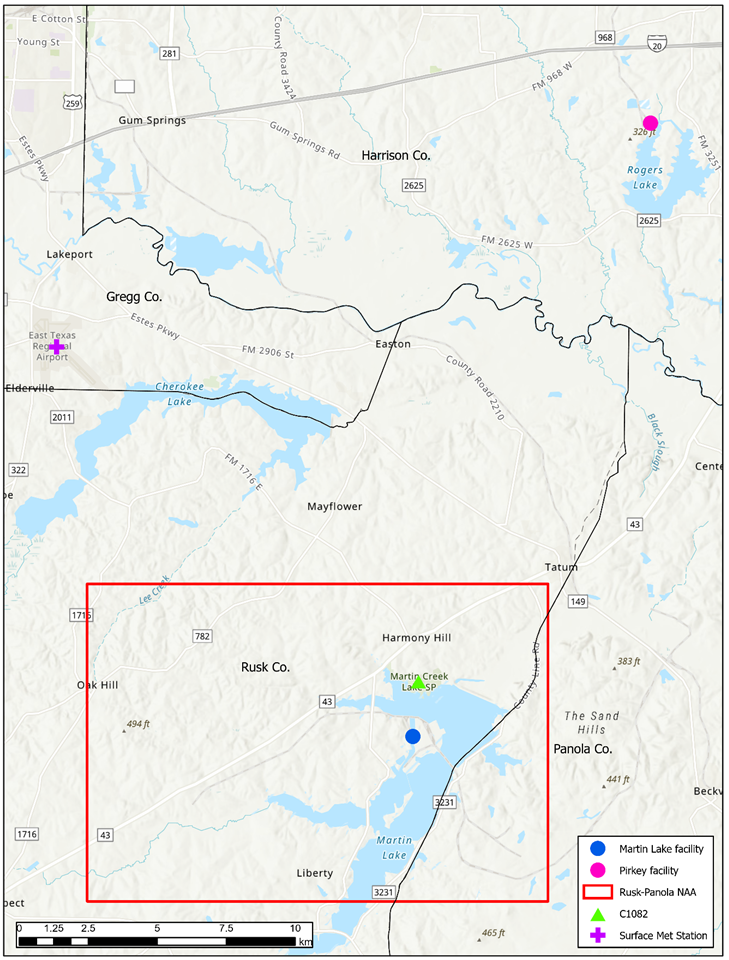Sulfur Dioxide Dispersion Modeling for Rusk and Panola Counties
Air dispersion modeling methods, files, and data, to support the Rusk and Panola Counties sulfur dioxide attainment demonstration for the State Implementation Plan (SIP) revision.
Parts of Rusk and Panola Counties around the Martin Lake Steam Electric Station (Martin Lake) do not meet the 2010 Sulfur Dioxide (SO2) National Ambient Air Quality Standard (NAAQS) . TCEQ has developed a plan to demonstrate how the area will meet the sulfur dioxide (SO2) standard. Below is TCEQ's dispersion modeling that was used for developing the plan, including a description of the pollution sources and the surrounding area.
If you have questions regarding these files, please email us at amda@tceq.texas.gov with "Rusk and Panola Counties SO2 Dispersion Modeling Files" in the subject line.
Area Overview
Martin Lake is the SO2 emissions source (blue dot on the map) within the Rusk and Panola Counties 2010 SO2 NAAQS nonattainment area. The Tatum County Road 2181d Martin Creek Lake monitor or Continuous Ambient Monitoring Station 1082 (C1082) is required under the Data Requirements Rule , and was sited (green triangle on the map) in 2017 to monitor SO2 concentrations near Martin Lake. The National Weather Service monitor used for surface meteorological data for this modeling (purple plus-sign on the map) is located at the Longview East Texas Regional Airport.

Model Configuration
The source for the Rusk and Panola Counties 2010 SO2 NAAQS nonattainment area was modeled with the standard practices outlined in Appendix W, Guideline on Air Quality Models .
Air Dispersion Model: AERMOD-Highly-buoyant Plume (AERMOD-HBP) version 21112
AERMOD Preprocessors:
- AERMET version 21112 to generate meteorological data files.
- AERMINUTE version 15272 to include measured one-minute wind averages.
- AERSURFACE version 20060 to determine the surface characteristics for the meteorological station.
- AERMAP version 18081 to gather elevation data for sources and receptors.
- The Building Profile Input Program for PRIME (BPIPPRM) version 04274 to calculate building downwash effects.
Meteorological Years Modeled: 2015 through 2019
Background Concentration: The background SO2 concentration used for this modeling was 6.0 parts per billion, taken from the 2019 design value from the Midlothian Old Fort Worth monitor (C52).
Modeling Data Files
You may view and download the AERMOD-HPB code, model runs, and control file inputs described below from the TCEQ Air Modeling secure FTP site . To download a large quantity of modeling files, please use an FTP client software, such as FileZilla , to access our secure FTP site:
- FTP address: sftp://amdaftp.tceq.texas.gov
- FTP directory: /SO2/Rusk-Panola/AERMOD-HBP/adoption
- User ID and password: Please sign up for a user account at https://amdaftp.tceq.texas.gov/user/
Data available includes:
- AERMOD-HBP source code and executables.
- Ancillary inputs (downwash, meteorology, and receptor input data).
- Run directories containing control files and model output.
If you would like to request any additional data related to the modeling for this SIP revision, please email us at amda@tceq.texas.gov with "Rusk and Panola Counties SO2 Modeling Files - Data Request" in the subject line and specify which data you are requesting.
SIP Revision and Related Appendices
Documents for the SIP revision and appendices related to this modeling are below:
- Rusk-Panola Attainment Demonstration SIP Revision for the 2010 SO2 NAAQS
- Appendix K: Modeling Technical Support Document (TSD)
- Appendix L: Documentation from Vistra Energy Corporation for Property Boundaries
- Appendix M: Alternative Model Documentation
For more on this SIP Revision, visit the Air Pollution from Sulfur Dioxide webpage.
